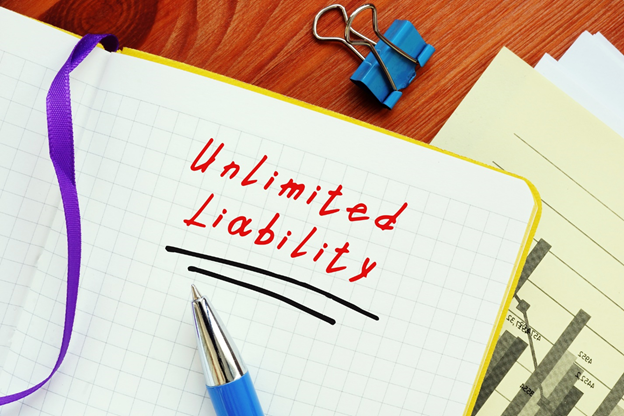Definition
Related Definitions
Unlimited Liability
What do you mean by unlimited liability?
Unlimited liability is the legal commitment of the owners of a business wherein they share the responsibility for the repayment of debts and other liabilities associated with the business if a company fails to meet its debt obligations. Once the general partners/ sole proprietors enter into this kind of agreement, it can even lead to confiscating their assets' if the company fails to pay off its liabilities. Thus, a company's financial obligations can be paid via the sale and seizure of the owner's personal property. Unlimited liability is therefore different from the limited liability business structure.
Summary
- Unlimited liability is the legal commitment of the owners of a business wherein they share the responsibility for the repayment of debts and other liabilities associated with the business if a company fails to meet its debt obligations.
- Unlimited liability companies are generally found in countries where company law is derived from English law.
Frequently Asked Questions
Explain unlimited liability with the help of an example?
Unlimited liability indicates that if a company fails to repay or defaults on its debt, each business owner would be equally liable, and their personal property could reasonably be seized to pay off the balance owed. This is primarily why most companies choose to form limited partnerships, where a business partner is responsible only up to the amount of money they invested in the company.
For example, consider a situation when four individuals are working as partners, and each one of them invests $35,000 into the new business they own in a partnership. In a year, the company accrues $325,000 in liabilities. If the company fails to repay these debts or defaults on the debts, all four partners will be equally responsible for the repayment. This means that besides the original investment of $35,000, all these four owners would be required to come up with $81,250 to pay off the $325,000 debt.

Image Source: © Rummess | Megapixl.com
Which countries have unlimited liability companies?
Unlimited liability companies are generally found in countries where company law is derived from English law. In the United Kingdom especially, unlimited liability companies are absorbed or established through registration under the Companies Act of 2006. Other jurisdictions where unlimited liability companies are formed under English law – India, Australia, New Zealand, Ireland, and Pakistan.
Besides, Germany, France, the Czech Republic, and two jurisdictions in Canada are the regions where these companies are usually formed. Though, in Canada, unlimited liability companies are known as unlimited liability corporations.
Irrespective of the number of companies and countries where unlimited liability companies exist, they are not a common form of company incorporation given the burden placed on owners to cover a company's debt, especially when the companies face the risk of bankruptcy.
One benefit of going for an unlimited liability subsidiary may be confidentiality. An unlimited liability company is not required to disclose or make public all its details. For example, Etsy, an e-crafts marketplace, created an Irish subsidiary in 2015 was incorporated as an unlimited liability company. This means that the company is no longer required to make public the reports on the money moved through the country or the tax paid by the company.
Joint-stock company (JSC) and the unlimited liability company
In the US, a joint-stock company (JSC) is the same as an unlimited liability company. In JSC, shareholders of the company have unlimited liability for company debts. Joint-stock companies work under New York and Texas associations under the Texas Joint-Stock Company or Revocable Living Trust model.
What are the advantages and disadvantages of unlimited liability?
Unlimited liability in business has its pros and cons. The three important factors considered while deciding the liability feature of a company, i.e. whether it will be an unlimited liability company or a limited liability company, size and nature of business, owner's capacity concerning finance, investment. Moreover, unlimited liability is considered more suitable for small businesses as low risks and rewards are involved. However, as the business grows, it is preferable to convert it into a limited liability. This is because an increase in the volume of business will also make it riskier, so limited liability owners may not feel confident when it comes to risky decisions. This will impact a business' growth, and in this way, many opportunities will be lost.
Some advantages of unlimited liability are as follows:
- Owners take the final call and have greater control over the business. In an unlimited liability company, the owners are free to take all business decisions without violating any law.
- Formation of sole proprietorship and general partnership firms is easy.
- There is greater scope for growth in an unlimited liability company since the owners do not shy away from taking risks that they think can be profitable. If a decision taken goes wrong, the burden will be shared collectively and not by a single person.
- Dissolving an unlimited liability company is easy because the owners are the key decision-makers.
- The overall income generated from the business goes to the owners.
- Another advantage of an unlimited company is non-disclosure. This ensures complete confidentiality in a business.
- Improved and cautious management decisions are taken in this type of structure since there is a risk of personal liability for wrong actions.
- Unlimited liability companies enjoy greater trust and confidence of the creditors and other stakeholders. Since the owners in this kind of setup have complete responsibility, they are likely to be more careful in business operations.
- In an unlimited liability company, the share capital and the initial investment are as per the owners' convenience.

Image Source: © Mitch1921 | Megapixl.com
Disadvantages of Unlimited Liability are:
- Unlimited liability holds the owners legally accountable for all the debts and liabilities of the business.
- Via unlimited liability, if a business fails to meet its financial obligations or defaults on its debts, each business owner would be equally liable, and their personal property could reasonably be seized to pay off the balance owed.
- Since in this kind of setup, the owners are very cautious while taking any major business decision, it slows down the development of the business. Due to the risk aversion tendency of owners, the business can even lose some growth opportunities.
- The growth of the business is concentrated in the hands of the owners. If the owner leaves, retires or dies, the business will become non-functional.
- Unlimited liability companies lack a restrictive structure.
- The results and performance of the business are not made public. Thus, such businesses lack transparency. Any mismanagement within the business is only revealed to the outside world when the company becomes bankrupt.
